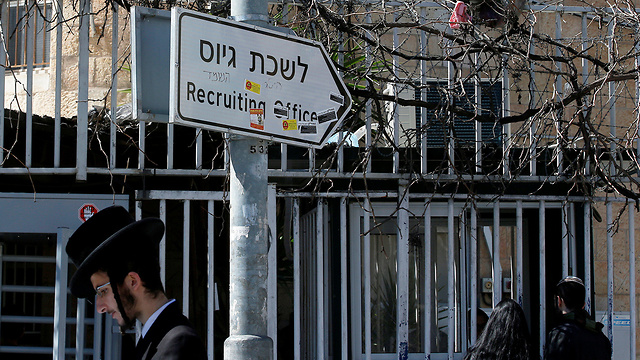
Haredim at the Jerusalem recruitment office
צילום: רויטרס
Council of Torah Sages orders MKs to quit if draft law passes
Rabbis of Agudat Yisrael, the Hasidic faction in United Torah Judaism, order their Knesset representatives to work to change the new draft law to ensure exemptions to yeshiva students and quit the government if it passes without the desired changes.
The Council of Torah Sages of Agudat Yisrael, the Hasidic faction in United Torah Judaism, ordered its representatives in the Knesset on Thursday to quit the coalition if the new draft law is passed, unless it is done in coordination with them and with their approval.
Members of the faction include Deputy Minister Yaakov Litzman and Meir Porush and MKs Yisrael Eichler and Menachem Eliezer Moses.
However, the Lithuanian members of UTJ—MKs Moshe Gafni, Uri Maklev and Ya’akov Asher—as well as members of the Sephardic ultra-Orthodox party Shas, are not bound by the decision.
The existing Israeli Defense Service Law expires in September after the High Court of Justice deemed it unconstitutional, and so the Knesset must pass an alternative law before then.
If a new law is not passed to regulate the exemptions of ultra-Orthodox yeshiva students, tens of thousands of them are expected to receive IDF draft orders.
A senior UTJ official said the party "will demand Prime Minister Netanyahu to have the state ask for a postponement from the High Court."
Agudat Yisrael's Council of Torah Sages, led by Litzman's rabbi the Rebbe of Ger Yaakov Aryeh Alter, ordered its MKs to work to change the existing bill proposal as well as ensure Defense Minister Avigdor Lieberman maintains the authority to exempt yeshiva students from the IDF draft.
The main points of contention in the proposed legislation are the planned cuts to the yeshivot's budgets and the use of economic incentives to pressure the Torah study institutions to encourage enlistment.
The Agudat Yisrael rabbis are worried that if enlistment quotas are set too high, they won't be able to meet them, and so yeshiva students would be forced to enlist or otherwise be incentivized to join the army by the offered economic benefits.
The rabbis want to change the law to ensure that in any case, a yeshiva student would not be forced to leave the Torah study institution and put on uniforms.
Agudat Yisrael is hoping the Councils of Torah Sages of Degel HaTorah, the second faction that makes up UTJ, as well as that of Shas, adopt the Hasidic rebbes' decision as well.
The Lithuanian and Sephardic rabbis will likely have no choice but to fall into line, as otherwise they run the risk of being seen as "compromisers" by their voters on a topic of utmost importance to the ultra-Orthodox public.
The leaders of the Haredi parties are regularly faced with accusations by hardliners of being "moderates" (a derogatory word in the ultra-Orthodox society), who allow legislation that could fatally harm the world of Torah to pass.
Shas and UTJ therefore try to tread lightly—on the one hand be involved in formulating the legislation rather than allow their rivals to have the final word, while on the other hand trying not to play into the hands of the hardliners.
The Defense Ministry and IDF's joint committee for drafting members of the ultra-Orthodox community has recommended establishing new enlistment tracks designed to promote Haredi integration in the job market.
The committee also recommended expanding the sanctions imposed on defectors and draft dodgers.
In addition, the committee recommended imposing significant financial sanctions for failing to meet the enlistment goals and supported promoting benefits and rewards to all IDF soldiers.
One of the committee's comprehensive recommendations is to revoke the law amendment (of rewarding Haredi soldiers) if 85 percent of the enlistment goals are not met within three consecutive years.
Moreover, benefits and rewards will be given to all those who serve in the army in order to diminish the inequality in the Israeli society, and national service will also increase tracks suitable for Haredi needs while promoting their integration in the employment world.
The new recommendations revoke criminal sanctions, thereby enabling most of the Haredim to remain in their yeshivot. The new annual goals determined by the committee are similar to those existing so far and are not binding—such as the enlistment quota that has to be met.
The committee's recommendations were unanimous and were approved by the defense minister and Chief of Staff Lt. Gen. Gadi Eisenkot.
The recommendations constitute the foundation on which the memorandum of the bill is currently being released to the public, prior to its presentation to the government and the Knesset.
The bill is supposed to be voted into a law by the end of the Knesset's summer session.













